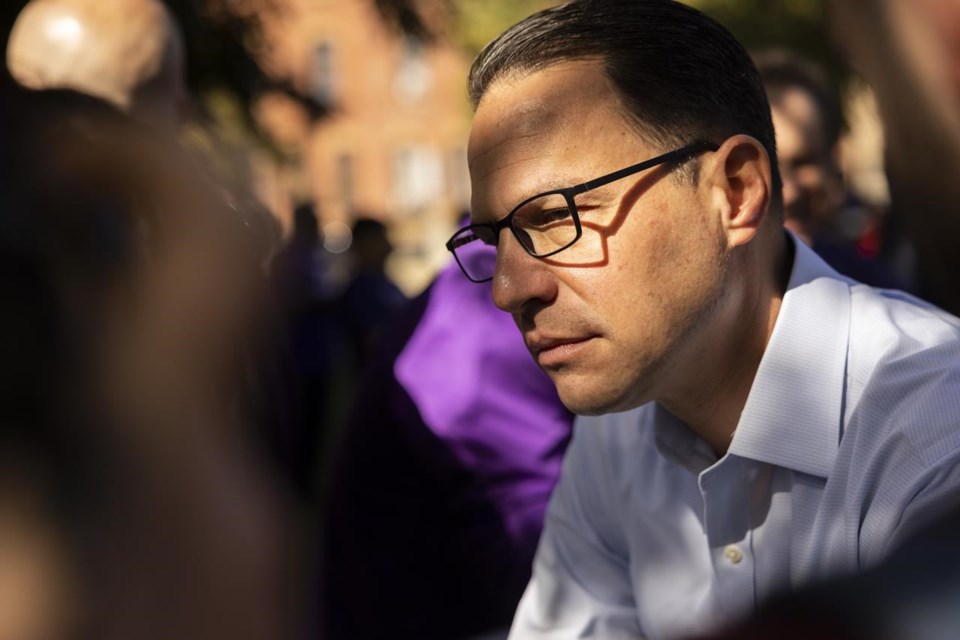CARMICHAELS, Pa. (AP) — In one of the most closely watched races in one of the most contested of battleground states, both gubernatorial candidates bring up religion. But in starkly different ways.
Republican Doug Mastriano’s campaign has several hallmarks of Christian nationalism, which fuses Christian and political imagery, words and rituals and promotes a belief that America has been and should be a Christian nation.
Democrat Josh Shapiro, meanwhile, talks about his Jewish faith in speeches and ads, saying it inspires him toward public service while he seeks to build a classic Democratic coalition of Black clergy and other progressive religious groups, including Christians and Jews, and the non-religious.
“My faith grounds me and calls me to do public service. I don’t use my faith to make policy decisions or to exclude others the way my opponent does,” Shapiro, Pennsylvania’s current attorney general, said in an interview.
Mastriano, a state senator, has rejected the “Christian nationalist” label, though his political events often carry the feel of a worship service. He was introduced at a church-hosted event near Pittsburgh by a pastor who mixed Christian and political imagery: “Get ready for a great ‘blood of Jesus’ red wave!”
At a campaign event in Pennsylvania’s rural southwestern corner, Mastriano stood at the front of a church, to the backdrop of an oversized campaign sign and a towering cross.
A pastor laid hands on him in a common Pentecostal custom and asked God for protection.
“We pray that you give him this courage and strength for what he’s about to face,” the pastor said at the gathering at Crosspoint Assembly of God. “We pray against the darkness and the enemies that come against him in the spiritual realm.”
Mastriano’s campaign did not respond to emailed requests for an interview. He has consistently ignored requests for comment from The Associated Press and many other media outlets.
At the recent church event, a campaign staffer told a reporter Mastriano would not be taking questions. Mastriano contended that he “watched various media outlets mock our faith” in their coverage of his primary victory rally, which was infused with worship music and Bible quotes. “My campaign has no place for intolerance and bigotry," he said.
That’s been challenged by Shapiro and others because Mastriano’s campaign paid $5,000 for what it described in a financial disclosure form as “consulting” services to Gab— a social media site popular with white supremacists and antisemites. It was on Gab, authorities say, that a suspect signaled his plans for the 2018 massacre of 11 worshippers at the Tree of Life synagogue building in Pittsburgh. It was the deadliest antisemitic attack in U.S. history.
Mastriano led efforts to overturn Pennsylvania’s vote for Joe Biden in 2020. He chartered buses to bring Pennsylvanians to the outdoor rally preceding the Jan. 6, 2021, Capitol insurrection. According to a Senate Judiciary Committee report, he passed through “breached barricades and police lines.”
The two candidates are appealing to the contrasting religious and ethnic demographics that have supported each side in recent campaigns such as the 2020 presidential election, when a majority of white Catholics and a large majority of white evangelical Christians voted Republican while Democrats drew on strong support from Black Christians, Latino Catholics, Jews, Muslims and people of no religion.
Several recent polls have shown Shapiro with a lead over Mastriano.
A September survey by the Franklin & Marshall College suggests Shapiro and Mastriano are running about even among Protestants and Catholics overall, while Shapiro leads among followers of no religion. The poll shows Mastriano leading among self-identified born-again or evangelical Christians.
Mastriano has “made no effort to soften” his hardline stances to a general election electorate, said John Fea, a history professor at Messiah University in Mechanicsburg, Pennsylvania, and author of “Believe Me: The Evangelical Road to Donald Trump.”
Mastriano takes a “black-and-white, spiritual-warfare view of the world,” Fea said. “Anyone who criticizes him is the devil. I’m not meaning this metaphorically. He really believes they are working for the cause of evil. ... That’s what makes him so dangerous.”
Still, some evangelicals “may be disgusted by his (Mastriano’s) Christian nationalism but cannot imagine themselves voting for a prochoice candidate like Shapiro,” Fea said.
He said Shapiro appears to be contrasting his broader view of religious freedom in a diverse population with Mastriano’s narrower one. Shapiro has criticized Mastriano’s statement that “all religions are not equal.”
A Pew Research Center report released Thursday said 45% of American adults surveyed, and 67% of those leaning Republican, believed the U.S. “should be a Christian nation,” though fewer want the federal government to formally declare itself Christian.
Mastriano spends much of his stump speeches denouncing a rise in crime, the incumbent Democratic administration’s COVID-19 restrictions and the participation of transgender athletes in girls’ sports. He has called banning abortion without exception a top priority.
Shapiro has said “my office is dedicated to protecting legal access to abortion in our Commonwealth,” where it is permitted through the 23rd week of pregnancy.
Each candidate draws supporters with a shared understanding of religion’s role.
At the Carmichaels church, Mastriano addressed a small but enthusiastic crowd on a September morning.
“I like the fact that he’s emboldened to (express) our religious values and our freedoms in the Bill of Rights,” said Steven Grugin of Dunkard Township. Speaking in a church “tells people that he’s very much for freedom of speech, freedom of religion,” he said.
The Rev. Marshall Mitchell, senior pastor of Salem Baptist Church of Abington, Pa., who has known Shapiro for years, said Shapiro “is as comfortable in a Black Baptist church as he is in a Conservative shul or a temple or a mosque,” Mitchell said. “He sees the common humanity, which he believes originates in God.”
___
Associated Press religion coverage receives support through the AP’s collaboration with The Conversation US, with funding from Lilly Endowment Inc. The AP is solely responsible for this content.
Peter Smith, The Associated Press



